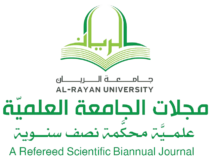
الملخص: | |
أردنا بهذا البحث التعريف ببقايا التأثير الجاهلي في شعر شعراء عصر صدر الإسلام؛ من خلال الآثار الجاهلية في جمل شعر المخضرمين وألفاظهم، والتي كانت في دلالات جمل الشعر وألفاظه، من خلال ذِكر المخلوق معطوفًا على الخالق في أمر لا يليق إلا بالله تعالى، والحلف بغير الله عز وجل، والتنكر لقضاء الله تعالى، ونسبة الفعل إلى الدهر، والزمان، واستعمال كلمة يثرب المنهي عن استعمالها، واستعمال اللعن في الهجاء، واستعمال كلمة طاغية في وصف من لم يعرف بذلك، واستعمال الألفاظ الحوشية، وآثار أخرى في موضوعات الشعر. بالإضافة إلى آثار جاهلية في محاكاة المقدمة الطللية، والمقدمة الغزلية، معتمدًا المنهج الوصفي لتحديد الظاهرة وبيانها وتأييدها بشواهدها. وكانت نتائج هذا البحث أنه توصل إلى: عظيم اهتمام العرب بالشعر وإشارة القرآن إلى ذلك، ووجود آثار جاهلية جلية في شعر المخضرمين، وسبب ذلك يرجع إلى بقاء بعض الشعراء في البادية العربية، وعدم تحولهم إلى حاضرة الإسلام، وتورط بعضهم بمعاصٍ وهذا عند الشاعر النجاشي، والشاعر سحيم عبد بني الحسحاس. هذا وقد كان الأثر الجاهلي متنوعًا لكنه ليس مطردًا؛ بل هو قليل مقارنة بكثير الموروث الشعري لشعراء صدر الإسلام. وبعض ذلك الأثر كان وجوده إجباريًا؛ لأنه محاكاة لنظام القصيدة العربية؛ إذ من الصعب ابتداع نظام جديد خلال تجربة شعرية وجيزة | الكلمات المفتاحية: ·التأثير الجاهلي · دلالة الجمل والألفاظ. ·مقدمة القصيدة. ·المخضرمون |
:ABSTRACT | |
The purpose of this research was to explore the remnants of pre-Islamic influence in the poetry of early Islamic era poets, specifically through the use of pre-Islamic elements in the phrases and expressions of veteran poets. These elements manifested in the use of phrases and expressions that associated the created beings with the Creator in a manner that is only appropriate for Allah the Almighty, swearing by other than Allah, denying the decree of Allah, attributing actions to time and the passage of time, using the word “Yathrib” whose use has been forbidden instead of its replacement, employing curses in satire, using the word “taaghiyah” (tyrant) to describe those who are not, and employing marginal expressions, among other poetic themes. Additionally, the research examined the pre-Islamic influences in the structure of the introductory and amorous sections, utilizing a descriptive approach to identify, explain, and support these phenomena with evidence. The findings of this research indicate a great interest among Arabs in poetry, as indicated by references in the Quran. There are clear pre-Islamic influences in the poetry of veteran poets, which can be attributed to their continued residence in the Arabian desert and their failure to shift to the Islamic capital. Some poets were also involved in sinful activities, as committed by Al-Najashi, and Suhaim Abd bani Alhashas. However, it should be noted that the pre-Islamic influence, although varied, was not dominant but rather minimal compared to the rich poetic heritage of early Islamic poets. Some of these influences were obligatory due to the need to adhere to the traditional Arabic poetic system, making it challenging to devise a new system within a short poetic experiment. | Key Words: · Pre-Islamic influence · Indication of sentences and words · Introduction to the poem. · The Mukhadrim Poets. |
